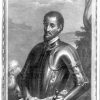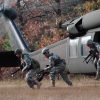calsfoundation@cals.org
François Danbourné (?–1702)
Between February and late July 1702, the Frenchman François Danbourné served as a trusted officer to Henri de Tonti, founder of Arkansas Post. Danbourné was a regional courier and skilled mediator who seemed to have a knack for negotiation, so much so that de Tonti often called on this young lieutenant to “make the early venture into a village or military site to prepare the inhabitants for the arrival of the French or a potentially threatening Native group.”
Nothing is known about Danbourné’s birth, parentage, or life before arriving in the New World. As Pierre le Moyne d’Iberville prepared to establish the French colony on the Mobile River in the early eighteenth century, he recognized the need “to break the Chickasaw-English trade alliance and then promote peaceful relations among the three Indian groups,” the Choctaws, Chickasaws, and Mobilians. The Choctaws were particularly vital to Iberville’s designs, since they were the Frenchmen’s most significant ally in the region. Thus, in January 1702, Iberville asked de Tonti and Danbourné “to go to the Choctaws and from there to the Chickasaws and strive to have them make peace with each other.” On February 8, 1702, de Tonti, Danbourné, and several other Frenchmen began their quest to broker peace.
After successful negotiations within the Chickasaws’ territory, these same men, as well as several Chickasaws, Choctaws, Mobilians, and Tohomés, journeyed to Mobile to profess their peaceful intentions throughout the region. Danbourné made the initial entry into the fledgling Mobile fortress on March 19 with de Tonti’s letter in hand that announced their forthcoming arrival and the need for assurances that those present would be readily available for the various participating nations in the peace accord. Six days later, de Tonti and the others arrived, and all of those present “offered promises of alliance for years to come, all in hopes of dispelling any attempts on the part of the English to continue their efforts in the Mississippi Valley.”
Danbourné also helped to explore Iberville’s desires to establish a trading post and mission among the Chickasaws. Iberville sent Danbourné and several other Canadians up the Mobile River into Chickasaw territory to the staging point for the proposed post and mission. Once identified, Danbourné, the soldier St. Laurent, and five Chickasaws continued on to the Illinois country, “to ask for the [return of] Chickasaw prisoners who are there,” and to secure peace between the two nations. Indeed, once among the Tamarois, a subgroup of the Illinois nation, the Chickasaws “sang the calumet to our Indians [the Tamarois] and made an alliance with them following the desires of M. d’Iberville,” wrote the seminary missionary Father Marc Bergier.
With promises of peace obtained, Danbourné began his final charge, to secure a missionary for Iberville’s proposed Chickasaw post and mission. As the leader of the Mississippi missionaries for the Seminaire de Québec, Bergier suggested that Father Nicolas Foucault, Roman Catholic missionary to the Quapaws, would be their best choice since he had yet to fully establish himself within the Quapaw nation. Consequently, Danbourné journeyed to the Quapaw village where he and his companion St. Laurent arrived in late July 1702. Likely, the Quapaws welcomed the two with a calumet ceremony to reaffirm the ongoing French alliance with this Arkansas nation.
Danbourné informed Foucault of Bergier’s and Iberville’s desire to place a seminary missionary among the Chickasaws. Since the Quapaws were smaller in number, and little progress had been made among them, Foucault “welcomed this opportunity” to begin anew as a missionary among this more eastern nation. But both Danbourné and St. Laurent were ill and could not muster the strength to paddle downstream. Thus, the French entourage hired two Koroas to help them. Less than a day’s journey below the Arkansas village, just at the meeting of the Arkansas and Mississippi Rivers, the Frenchmen and their Koroa escorts pulled up along the banks so that Father Foucault could set up his portable altar and celebrate the Eucharist. Consequently, Foucault had goods to unpack—a shiny cruet and chalice, a bottle of wine, a silver paten, and perhaps even fine liturgical linens. Undoubtedly, the Koroas got a first-hand peek at Foucault’s possessions. During the Eucharist, the Koroas killed the Frenchmen and seized their goods, some of which they took immediately to their village; the remainder they hid for later retrieval.
The murderous act was reported as a “non-political, spontaneous assault by a few greedy Koroa underlings…who seized an opportunity to gain coveted possessions.” As such, the two Koroas were executed by their own nation. But the death of Danbourné and the others deeply disturbed Frenchmen in the region. Danbourné had been one of de Tonti’s most trusted officers, and the loss of Foucault ended Iberville’s quest to place a missionary among the Chickasaws. More importantly, although Danbourné spent little time among the Arkansas nation, the depth of alliance between the French and the Quapaws in the early eighteenth century became very apparent soon after his death. This close relationship between the French and Quapaws began in 1673, when Father Jacques Marquette and his confrère Louis Joliet celebrated the calumet ceremony with the Quapaws. The Arkansas nation reaffirmed this same alliance with de Tonti and René Robert Cavelier, Sieur de la Salle nine years later. Due to their commitment to engage in reciprocal relations, and to protect each other when needed, Danbourné and the others were honorary kin and the Quapaws became responsible for supporting them. Thus, once Danbourné and his colleagues were murdered, the Quapaws lost important symbols of relationship, lost fictive members of their nation, and experienced an imbalance in their society.
Consequently, the Quapaws avenged the deaths of Danbourné, Foucault, St. Laurent, and Buison, an act that verified their cultural commitment to their French allies. The Quapaws, assisted by their Illinois allies, “virtually decimated the Koroas.” As historian Morris Arnold remarked, the Quapaws well understood their obligation toward defense and support, leading them to avenge Danbourné’s and the others’ deaths so to restore balance within their society and to continue their ongoing alliance with the French.
For additional information:
Arnold, Morris. Colonial Arkansas, 1686–1804: A Social and Cultural History. Fayetteville: University of Arkansas Press, 1991.
———. Rumble of a Distant Drum: The Quapaw and Old World Newcomers, 1673–1804. Fayetteville: University of Arkansas Press, 2000.
Higginbotham, Jay. “Henri de Tonti’s Mission to the Chickasaw, 1702.” Louisiana History 19 (Summer 1978): 285–296.
———. Old Mobile: Fort Louis De la Louisiane, 1702–1711. Tuscaloosa: University of Alabama Press, 1991.
Jones, Linda C. “François Danbourné: Colonial Courier.” Arkansas Historical Quarterly 80 (Spring 2021): 38–52.
———. “Nicolas Foucault and the Quapaws.” Arkansas Historical Quarterly 75 (Spring 2016): 2–26.
Linda C. Jones
University of Arkansas, Fayetteville
 European Exploration and Settlement, 1541 through 1802
European Exploration and Settlement, 1541 through 1802 Military
Military



Comments
No comments on this entry yet.